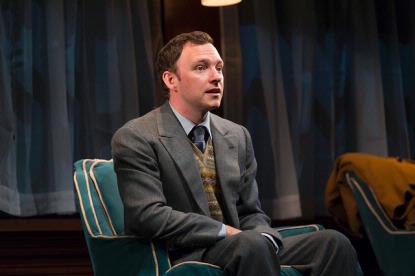Ring Lardner was the master of comic fiction with a cynical edge and George S. Kaufman the master of urbane Broadway farce. When they teamed up in 1929 to adapt a Lardner show-biz story, the result was June Moon, an urbane romantic comedy with an ironic edge. Though the show, which lampooned the early Tin Pan Alley songwriting machine, enjoyed a good run on the Great White Way, it had neither the gritty bite of Lardner’s baseball pseudo-biography You Know Me, Al nor the giddy energy of Kaufman and Moss Hart’s You Can’t Take it With You and The Man Who Came to Dinner, and it’s rarely been revived. So the current revival at the Williamstown Theatre Festival, running through this weekend, is a welcome opportunity to encounter this charming if imperfect period piece in a smart, stylish production by Jessica Stone.
It’s a lamb-among-the-wolves story. Young Fred, an aspiring lyricist in search of a composer and a songwriting career, leaves his upstate hometown to cast his lot in the big city. On the train he meets dewy, innocent – and of course beautiful – Edna (Rachel Napoleon). She’s the girl for him, but he’s distracted from their budding courtship by his writing partnership with one-hit wonder Paul (Rick Holmes) and by Paul’s sister-in-law Eileen (Holley Fain), a man-eating gold digger.
While the plot spins around the romantic triangle and the duo’s attempts to place their lame but catchy song “June Moon” with a major music publisher, the show’s best laughs come from the music business types who plug away at songs, or at plugging songs, in the publisher’s offices. (Tobin Ost’s expansive second-act set suggests a suite of cubby-hole songwriters’ rooms and features no fewer than five upright pianos, with live renditions of period songs.)
Pushy, manic Benny (Christopher Fitzgerald) writes hilariously awful novelty numbers. Sensitive, sardonic (and in David Turner’s well-tuned performance, subtly gay) accompanist Maxie masks his own frustrated ambitions with acerbic one-liners. Mr. Hart (a wry nod to Kaufman’s writing partner? or to Richard Rodgers’ lyricist?), the music publisher on whose capricious say-so the songwriters’ hopes rise or crash, is a lying philanderer (and in Timothy Shew’s hands, a burly bully).
Fred, the boy-scout courteous, blithely confident and hopelessly naive center of the competitive hive, is played by Nate Corddry (who virtually grew up at WTF) with a guileless sincerity that makes us root for the guy even as we chuckle at his rube’s outlook and misadventures.
 Nate Corddry
Nate Corddry
T. Charles Erickson photo
MISSED OPPORTUNITIES
The Roaring Twenties are also being celebrated at Shakespeare & Company, where Tony Simotes has set his production of A Midsummer Night’s Dream in Jazz Age New Orleans. It’s a nice concept – the carnival King and his Amazon Queen preparing for their Mardi Gras nuptials while a multicultural krewe of locals prepare a clumsy entertainment and a mixed-up quartet of lovers escape the seething city for the sprite-infested countryside. But the conceit doesn’t have the courage of its convictions.
The courtiers in Athens/N’awlins are dripping with beads and the sextet of “rude mechanicals” double as a ragtime combo – another potpourri of twenties period songs here (except for one anachronistic WWII-era number) in nice arrangements by Alexander Sovronsky – but the Big Easy milieu is no sooner established than it’s virtually abandoned. The fairyland forest looks and feels like what you’d expect from any traditional gossamer staging of the Dream, as are Rocco Sisto and Merritt Janson’s arch performances as Oberon and Titania. Michael F. Toomey’s Puck, though, is simply baffling: a giggling prankster who wears an antique aviator helmet with floppy ears – supernatural Snoopy?
And with the exception of most of the “Pyramus and Thisbe” players, none of the performers attempt gumbo-flavored characterizations. Chief among the exceptions are Jonathan Epstein, whose Peter Quince, leader of the hapless theatricals, has a delicious Cajun drawl and a Dr. John swagger, and Johnny Lee Davenport as a strutting black Bottom. Malcom Ingram gives a gentlemanly fey twist to Starveling/Moonshine, and Annette Miller assays a Gulf Coast twang for Snug/Lion but smacks more of Blanche Dubois than Marie Laveau.
There are some delightful comic moments. I loved seeing Kelly Galvin’s petite Hermia beating the stuffing out of Colby Lewis’s rangy Demetrius, David Joseph’s Lysander clumsily pursuing Cloteal L. Horne’s Helena with one shoe missing, and the mechanicals’ rendition of the “Pyramus and Thisbe” skit gives good comic value. But too much of the production suffers from missed conceptual and comedic opportunities.
Shakespeare & Company have long pursued a “color-blind” casting policy, but here, with African Americans (Horne and Lewis) as two of the lovers, Simotes misses an opportunity to for once acknowledge and exploit the racial differences. Since the lovers’ flight into the forest is spurred by Hermia’s passion for Lysander, in defiance of a parental decree that she marry Demetrius, it seems odd that, especially in this Deep South setting, the parent (in this case her mother, Annette Miller with a Colonel Sanders accent) wants to pair her white daughter with the black guy, and disappointing that in the end the rocky course of true love results in the “right” (monoracial) pairings, when a little heartfelt miscegenation would have been more interesting.
.jpg) Jonathan Epstein & Alexander Sovronsky
Jonathan Epstein & Alexander Sovronsky
Kevin Sprague photo
* * *
If you’d like to be notified of future posts, email StageStruck@crocker.com


